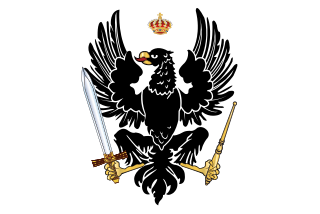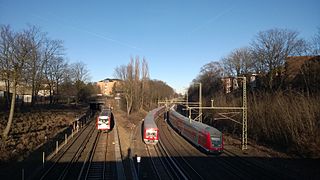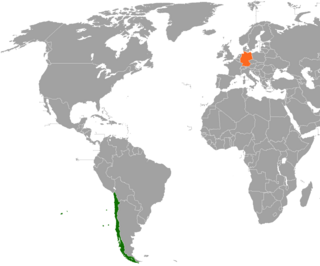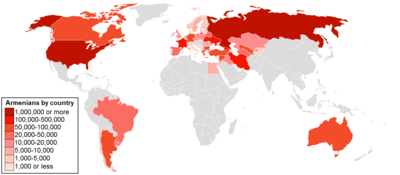
The Kingdom of Prussia was a German kingdom that constituted the state of Prussia between 1701 and 1918. It was the driving force behind the unification of Germany in 1871 and was the leading state of the German Empire until its dissolution in 1918. Although it took its name from the region called Prussia, it was based in the Margraviate of Brandenburg. Its capital was Berlin.

The North German Confederation was initially a German military alliance established in August 1866 under the leadership of the Kingdom of Prussia, which was transformed in the subsequent year into a confederated state that existed from July 1867 to December 1870. A milestone of the German Unification, it was the earliest continual legal predecessor of the modern German nation-state known today as the Federal Republic of Germany.

Prussia was a German state located on the southeast coast of the Baltic Sea. It formed the German Empire when it united the German states in 1871. It was de facto dissolved by an emergency decree transferring powers of the Prussian government to German Chancellor Franz von Papen in 1932 and de jure by an Allied decree in 1947. For centuries, the House of Hohenzollern ruled Prussia, expanding its size with the Prussian Army. Prussia, with its capital at Königsberg and then, when it became the Kingdom of Prussia in 1701, Berlin, decisively shaped the history of Germany.

Poles in Germany are the second largest Polish diaspora (Polonia) in the world and the biggest in Europe. Estimates of the number of Poles living in Germany vary from 2 million to about 3 million people living that might be of Polish descent. Their number has quickly decreased over the years, and according to the latest census, there are approximately 866.690 Poles in Germany. The main Polonia organisations in Germany are the Union of Poles in Germany and Congress of Polonia in Germany. Polish surnames are relatively common in Germany, especially in the Ruhr area.
Australian rules football in Germany is currently played by six clubs within the Australian Football League of Germany (AFLG) the governing body. Three clubs run metro leagues. The Dresden Wolves compete in the CAAFL of the Czech Republic and some other formative clubs play on an ad hoc basis within Germany.

Schlaich bergermann partner is a nationally and internationally active structural engineering and consulting firm with headquarters in Stuttgart, Germany and branch offices in Berlin, New York City, São Paulo, Shanghai and Paris.
German Assyrians are Germans of Assyrian descent or Assyrians who have German citizenship. The Assyrians in Germany mainly came from Azerbaijan, Turkey, Jordan, Syria, Iraq and Iran.
Ivan Nagel was a German theater scholar, critic and former theater director of Hungarian origin.

Rapid transit in Germany consists of four U-Bahn systems and fourteen S-Bahn systems. The U-Bahn commonly understood to stand for Untergrundbahn are conventional rapid transit systems that run mostly underground, while the S-Bahn or Stadtschnellbahn are commuter rail services, that may run underground in the city center and have metro-like characteristics in Munich, Hamburg and Berlin which they only have to a lesser extent in other cities. There are also over a dozen premetro or Stadtbahn systems that are rapid transit in the city center and light rail outside.

Belgian-German relations are the interstate relations between Belgium and Germany. Both of these are neighbouring countries and share a common 204 kilometer long landborder. Both nations are members of NATO, the European Union and the Eurozone.
The Albanians in Germany refers to the Albanian migrants in Germany and their descendants. They mostly trace their origins to Albania, Kosovo and to a lesser extent to North Macedonia and other Albanian-speaking territories in the Balkan Peninsula. Their exact number is difficult to determine as some ethnic Albanians hold German, Macedonian, Serbian or another Former Yugoslavian citizenship.
By September 2011, there were more than 1,000 amateur leagues on every inhabited continent, in countries such as Canada, Australia, the United Kingdom, New Zealand, Germany, Belgium, Finland, Sweden and Singapore
Hidden Armenians or crypto-Armenians is an umbrella term to describe Turkish citizens hiding their full or partial Armenian ancestry from the larger Turkish society. They are mostly descendants of Ottoman Armenians who, at least outwardly, were Islamized "under the threat of physical extermination" during the Armenian genocide.

Nepalis in Germany consists of immigrants, refugees and expatriates from Nepal as well as German people of Nepalese descent. Most of them live in large cities like Munich, Frankfurt, Hamburg and Berlin. However they are spread all over Germany. Nepalese living in Germany have basically three different backgrounds: (a) Those who came as au-pair and student, (b) Those who arrived german on the basis of familie reunion and (c) those who have been arrived as refugees.

The 2024 UEFA European Football Championship, commonly referred to as UEFA Euro 2024 or simply Euro 2024, will be the 17th edition of the UEFA European Championship, the quadrennial international men's football championship of Europe organised by UEFA. Germany will host the tournament, which is scheduled to take place from 14 June to 14 July 2024. It will be the third time that European Championship matches are played on German territory and the second time in reunified Germany as the former West Germany hosted the tournament of 1988, and four matches of the multi-national Euro 2020 were played in Munich. It will be the first time the competition is held in the region of former East Germany with Leipzig as a host city, as well as the first time that a reunified Germany served as a solo host nation. The tournament will return to its usual 4-year cycle, after Euro 2020 was delayed to 2021 due to the COVID-19 pandemic.

German-Chilean relations are foreign relations between Germany and Chile. Around 12,300 kilometers separate Chile and Germany but both nations still share a wide range of bilateral relations. Over the course of the last 150 years many Germans have settled in Chile for several different reasons. Migrating in the opposite direction, several thousand Chileans sought refuge in Germany during Pinochet's dictatorship.

There is a community of Japanese people in Germany consisting mainly of expatriates from Japan as well as German citizens of Japanese descent.

Ghanaians in Germany are Ghanaian immigrants in Germany and their descendants living and working in Germany. Ghanaians in Germany are said to form the second largest of the country’s diaspora populations in Europe, after the United Kingdom.












